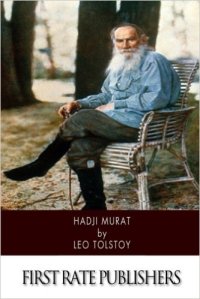Hadji Murat is a novella that Tolstoy worked on for close to a decade late in his life. He manifested no intention of publishing it, and so it wasn’t published until after his death.
For the last several decades of his life, Tolstoy pretty much abandoned the classic fiction writing for which he is best known (e.g., War and Peace, Anna Karenina), and to the extent that he wrote at all focused almost entirely on religious and moral writing based on his pacifist and anarchist philosophy. He wrote mostly nonfiction during this period. When he did occasionally write fiction (Resurrection being the only full length novel), it was dismissed by many critics and readers as didactic.
Interestingly, although Hadji Murat came during this period, and indeed near the end of it when Tolstoy was farthest from his career as a conventional novelist, it strikes me as one of his least moralistic writings. Certainly one can find moral themes in it—as one can in virtually any fiction—but it’s hardly propaganda for Tolstoyan nonviolence.
It most closely resembles an early novel of Tolstoy’s—The Cossacks, written in the 1850s and 1860s. Both The Cossacks and Hadji Murat are about Russia’s off and on warfare with the Muslim tribes of the Caucasus, which Tolstoy had personal knowledge of since that is where he had performed his own military service as a young man.
Hadji Murat is also sometimes rendered as Hadji Murad. Google, in fact, indicates that the latter is the more common spelling. Wikipedia, though, notes that Hadji Murat is the more accurate in the sense of being the closer of the two to the original Russian. To confuse matters further, the book is based on the life and career of a real person, and Wikipedia spells his name as Hadji Murad.
The edition of the book I have uses both—Hadji Murat as the title of the book, and “Hadji Murad” in the body of the book. It’s possible this is intentional, that the publishers came to the same conclusion as Wikipedia, that Murat is the best translation of Tolstoy’s book title and Murad of the character’s (and historical person’s) name, or it’s possible it’s an inconsistency caused by sloppiness.
Ninety-nine times out of a hundred I’d go with intentional, but here I lean toward blunder, because overall this is an atrociously printed book. From an outfit called “First Rate Publishers,” it literally looks like something someone ran off on a printing press in their basement.
There are typos galore, often multiple on a page. Apostrophes are routinely replaced by underscores. The font is tiny, with unusually large margins. The pages are not numbered. There is only the text of the book itself; there is none of the usual additional material virtually any book has, such as the date of publication, ISBN number, etc.
Anyway, Hadji Murad was an Avar leader, the Avars being one of the many tribes of the region pestering the Russians. Throughout his career he switched sides multiple times, allying with various other commanders or rebel tribes, or the Russians themselves, depending on who had most recently betrayed him, and where he perceived his self-interest and the interest of his people to lie.
In the period covered in the book, Murad has had a falling out with another Muslim tribal leader, who is now holding his family hostage and seeking to capture and kill Murad himself. Murad decides to surrender to the Russians and to bring as many people from the area as he can along with him to assist the Russian cause, in exchange for their aiding him in rescuing his family and defeating his rival.
The Russians are delighted to have him, but aren’t entirely sure just how to treat him or what to do with him. They are not totally convinced he’s even sincere; they know it’s possible he is in effect spying on them and intending to return to the other side.
To a degree they treat him as a visiting foreign dignitary, but at the same time regard him as a prisoner. So his status as a prisoner is not at all apparent on the surface, but exists more as potential. As long as he does not seek to leave, he is treated with much deference. He is invited to their high class military balls and such, making the acquaintance of various officers and nobles and their families. But there are always soldiers nearby, making sure he doesn’t try to leave.
He is impatient, as he wants to rescue his family as soon as possible. The Russians are noncommittal on this. Clearly they want him as a military ally, but are indecisive about whether and how to assist him in saving his family. They kick the decision up to higher and higher levels of the military and governmental bureaucracy, which means time-consuming journeys by messengers on horseback to and from their superiors (this is the 19th century, and they are way out in the boondocks), while they stall.
Tolstoy presents the military conflict itself pretty neutrally, with neither the Russians nor the Muslim warriors as clear good guys or bad guys. It’s war, so people slaughter each other under orders and commit the usual atrocities and betrayals, with neither side coming across as particularly justified or noble in their fighting. Murad as an individual, though, is presented largely sympathetically.
Tolstoy describes the Russians mercilessly realistically. He shows that the decisions of the higher ups that have life and death consequences for countless ordinary soldiers are based less on right and wrong or even military strategy than on various mundane personal and political motivations—who is mad at whom, who is jealous of whom, who anticipates his career will be advantaged by what, etc.
The Russian officers are not simplistically evil or corrupt, just evil and corrupt to the normal degree folks tend to be. Certainly the higher stakes of war have not caused them to be especially thoughtful and responsible.
The Tsar himself comes across quite poorly. I know Tolstoy didn’t publish this, but it’s still a little jarring to read something written under an autocracy present the supreme leader as being at best a petty mediocrity. By that point I suppose Tolstoy was so old and so openly at odds with the Russian government (and church and establishment in general) that even if the story did become public he no longer cared and was just going to speak his mind regardless of the consequences.
I found that I squirmed as much or more in empathy for the gambling addict officer destroying his life as for those killed and maimed in the actual warfare. It’s a brief but striking depiction of addiction.
Hadji Murat is somewhat interesting, but overall not one of the more memorable or powerful of Tolstoy’s writings. I’d recommend it for Tolstoy fans who appreciate his somewhat cynical realism, but there are other Tolstoy books I’d rank above it.

